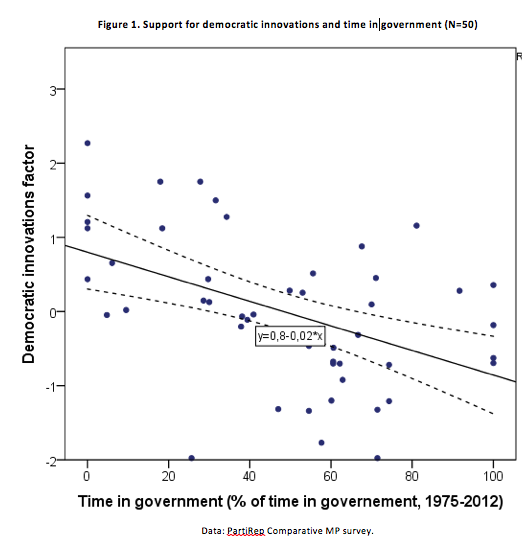Reluctant elites: democratic innovations are popular – but rare. Brexit shows why
People want more say in the democratic process – by voting in referendums and taking part in town hall debates, for example. But in fact these kinds of democratic innovation are rare. Caroline Close and Lidia Núñez explain how parties in power have a vested interest in keeping things the way they are, particularly given how risky referendums can be (as David Cameron knows only too well).

‘Referendum – Yes! Felipe will not be King.’ A demonstration in Seville in 2014 calls for a referendum on the monarchy. Photo: Ana Rey via a CC-BY-SA 2.0 licence
Serious concerns were raised about the way the EU referendum was conducted: the accuracy of information sent to voters by campaigners on both sides, the poor quality of the debate and lack of true public deliberation. Yet devices like referendums are sometimes lauded as a means of offsetting the shortcomings of traditional representative democracy – as a way of increasing citizens’ interest and participation in the decision-making process, and regaining their trust in the political system and elites.
As recently shown[i], citizens across the democratic world overwhelmingly support more referendums and other types of democratic innovations –e.g. citizens’ initiatives, petitions, deliberative events etc. Political elites, too, at both the national and supranational level[ii], regularly express their willingness to give citizens a greater say in the decision-making process.
Advanced democracies have brought in some reforms – notably the direct election of office-holders, more referendums and initiatives[iii], and the development of deliberative events such as citizen’s assemblies and town hall debates – British Columbia and Ontario’s Citizens’ Assemblies and the Dutch Burgerforum are examples. But these have had varying success in terms of participation and policy impact. In spite of an apparent favourable trend towards opening up the political system, institutional reforms in fact rarely occur. Why are democratic innovations so rare?
Those in power have little interest in changing things
Institutions have long been considered stable features of the polity, and this stability has often been used as to explain the inertia of political regimes and systems. However, in recent decades, the introduction of electoral reforms in several countries has put into question this old-fashioned interpretation. There have been calls for a new examination of institutions as variables affected by contextual, sociological, rational or other factors. An important part of the research on this topic has focused on the two main motivations of the actors directly involved in reform.
First, actors might be driven by instrumental or rational motivations: political elites are not expected to change a system in which they are winning. Parties which benefit from the existing system or status quo would face a high risk of losing their power if reforms were to be implemented.
Second, scholars have highlighted the role of values and ideas, in terms of left-right orientations and conceptions of good governance and democracy. In a recent research, we show that similar dynamics may be at play when democratic innovations are proposed.
Arguably, in the current representative system, the decision to implement reforms lies in the hands of elected political elites. The scarcity of reforms can therefore be attributed to their reluctance to change the system. Our research examines the opinion of 840 parliamentarians from 50 parties elected in 15 national assemblies on the desirability of implementing democratic innovations[iv], and assesses the extent to which political elites in Europe favour it.
The PartiRep Comparative MP Survey questionnaire used in this research proposes several changes (table 1) that would give citizens a greater say in the types and the direction of policies that are introduced. These items appeal to participatory (items 1 and 2), corporatist (item 3) or deliberative (item 4) models of democracy. For each item, MPs had to position themselves on a scale ranging from 1 (‘not at all desirable’) to 4 (‘very desirable’). In order to compare parliamentary parties’ positions, we calculate and use the average position of each party’s MPs.
As the table shows, levels of support are quite similar for all the statements and range between 2.2 and 2.85 – thus only slightly leaning towards desirability. Interestingly, support for increasing the number of referendums has the lowest average, and greatest variance. Statistical analyses reveal that support for these four items significantly correlate, and can be subsumed into one dimension or factor (principal component analysis) accounting for the parties’ level of support for the implementation of democratic innovations. We use this factor as the dependent variable, and test the effect of instrumental and value-laden factors on this level of support.
Statements about democratic innovations
| Of each of the following directions reform could take, could you indicate how desirable you find them? | Mean | Standard deviation |
|---|---|---|
| Increase the number of referendums | 2.21 | 0.69 |
| Create more opportunities for citizens to set the political agenda | 2.85 | 0.51 |
| Involve special interest groups in society more often in decision-making | 2.62 | 0.37 |
| Increase the number of deliberative events, where groups of ordinary people debate and decide on a particular issue | 2.78 | 0.43 |
Democratic innovations entail a transfer of power to citizens – to the detriment of established elites. As such, these elites – those who are in government more often or that have higher chances of being in it – should be more reluctant to implement democratic innovations than parties which are with the status quo institutions. Our analysis shows that the longer parties have been in government, the less favourable they are to introducing democratic innovations. Britain is a good example: Labour, which was part of the government 39.4% of the time between 1975 and 2012, has a score of -0.111 on the democratic innovation support factor. The Conservatives, which governed 60.6% of the time, score lower at -0.488.

High principles are lost when a party comes to power
We then test the effect of value-laden motivations by examining the role of the parties’ ideology or family, a concept that goes beyond a mere distinction between left and right, and appeals to the parties’ deep values and principles. Ideologies, we argue, reflect a certain interpretation of how democracy should work and how power should be distributed. Figure 2 indeed reveals differences across ideologies (displayed from the most left-wing to the most right-wing) that cannot be reduced to a linear left-right effect. On the contrary, a curvilinear effect seems to be at play, with parties situated at both ends of the spectrum showing greater support for the implementation of democratic innovations than parties at the centre of the spectrum. Interestingly, parties at each extreme are also those mostly excluded from government. They often develop anti-party or anti-establishment rhetoric, by stressing the need to give citizens a larger role in the political process to the detriment of established political elites that are blamed for the failures of the political system. Still, among the more centrist ideologies, we do find a left-right effect: left-wing parties have higher scores than right-wing parties.
While democratic innovations can be used to bypass delegation to elected representatives, they still hold the power to decide by using direct democracy devices and abiding (or not) by the outcome of public consultations. Governing elites seem to be less inclined to resort to a participatory or deliberative decision-making process, as that would lessen their control over policy outcomes. Parties excluded from power may well develop positive rhetoric on the need to re-engage citizens in the day-to-day decision-making process, but electing them does not guarantee that change will occur. Flinders (2010, p.43) argues that ‘opposition parties support reform […], only to renege on such commitments once in office (and vice versa)’. Ideological orientations and convictions can also lead political actors to defend participatory forms of democracy, but again, there is no guarantee that when in power they would reform the decision-making process.
And even when democratic innovations do occur, they often have limited impact in terms of participation and policy outcomes. The EU referendum has shown the limits of such devices, and their potential democratic shortcomings – perceived tyranny of the majority, competing legitimacies, dilution of responsibility, etc. The reality of these shortcomings could affect support for the use of direct democracy devices, even among their fiercest supporters. But by ignoring citizens’ demands to revitalise politics, political elites risk widening the democratic deficit.
References
[i] See Bengtsson, Å. and Mattila, M. (2009), ‘Direct Democracy and its Critics: Support for Direct Democracy and ‘Stealth’ Democracy in Finland’, West European Politics, 32(5): 1031–48 ; Bowler, S., Donovan, T., and Karp, J.A. (2007), ‘Enraged or Engaged? Preferences for Direct Citizen Participation in Affluent Democracies’, Political Research Quarterly, 60(3): 351‑62.
[ii] Schmitter, P.C., and Trechsel, A.H. (2004), The Future of Democracy in Europe: Trends, Analyses and Reforms, Green Paper for the Council of Europe (Council of Europe Publishing); Smith, G. (2005), Beyond the Ballot: 57 Democratic Innovations from Around the World (London: The Power Inquiry).
[iii] Altman, D. (2010) Direct Democracy Worldwide. Cambridge: Cambridge University Press; Anderson, C., and Goodyear-Grant, E. (2010) ‘Why are highly informed citizens sceptical of referenda?’, Electoral Studies, 29(2), 227‑38.
[iv] Austria, Belgium, France, Germany, Hungary, Ireland, Israel, Italy, the Netherlands, Norway, Poland, Portugal, Spain, Switzerland, the United Kingdom.
This post represents the views of the authors and not those of Democratic Audit.

 Caroline Close (left) is a postdoctoral researcher (F.R.S.-FNRS) at the Université libre de Bruxelles
Caroline Close (left) is a postdoctoral researcher (F.R.S.-FNRS) at the Université libre de Bruxelles
Lidia Núñez is a consultant and honorary postdoctoral researcher (F.R.S.-FNRS) at the Université libre de Bruxelles.





 Democratic Audit's core funding is provided by the Joseph Rowntree Charitable Trust. Additional funding is provided by the London School of Economics.
Democratic Audit's core funding is provided by the Joseph Rowntree Charitable Trust. Additional funding is provided by the London School of Economics.
https://t.co/2oe979Qf0n Excellent analysis for Y12 Politics #brexit #democracy
Reluctant elites: democratic innovations are popular – but rare. Brexit shows why https://t.co/IaRu6Fy7u0
Reluctant elites: democratic innovations are popular – but rare. Brexit shows why https://t.co/2Th5m6heMF
Reluctant elites: democratic innovations are popular – but rare. Brexit shows why https://t.co/XcEP7LuRdo
Reluctant elites: democratic innovations are popular – but rare. Brexit shows why https://t.co/ZVt1z9Pi41
Reluctant elites: democratic innovations are popular – but rare. Brexit shows why https://t.co/ZVt1za6SVz https://t.co/BSodfr8icl